|
|
|
Sort Order |
|
|
|
Items / Page
|
|
|
|
|
|
|
| Srl | Item |
| 1 |
ID:
157419
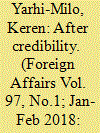

|
|
|
|
|
| Summary/Abstract |
Believe me.” U.S. President Donald Trump has used that phrase countless times, whether he is talking about counterterrorism (“I know more about ISIS than the generals do. Believe me”), building a wall along the U.S.-Mexican border (“Believe me, one way or the other, we’re going to get that wall”), or the Iran nuclear deal (“Believe me. Oh, believe me. . . . It’s a bad deal”).
|
|
|
|
|
|
|
|
|
|
|
|
|
|
|
|
| 2 |
ID:
142800
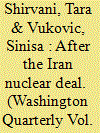

|
|
|
|
|
| Summary/Abstract |
The Iran deal inspires new questions such as why has the agreement come about now? And can the parties create momentum to cooperate on other issues? In Europe's case, the overlooked actor may have been motivated by an overlooked element: potential energy cooperation to help escape Russia's gas monopoly.
|
|
|
|
|
|
|
|
|
|
|
|
|
|
|
|
| 3 |
ID:
186975
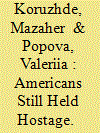

|
|
|
|
|
| Summary/Abstract |
MAZAHER KORUZHDE and VALERIIA POPOVA examine the effect of the Iran hostage crisis on American public opinion on the 2015 Iran nuclear deal. They argue that Americans who were “old enough” to share a collective memory of the crisis form a “crisis generation” and are significantly less likely to approve of the deal, regardless of their party and ideological orientations.
|
|
|
|
|
|
|
|
|
|
|
|
|
|
|
|
| 4 |
ID:
180424
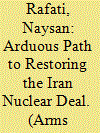

|
|
|
|
|
| Summary/Abstract |
A change in U.S. administrations brought with it something rare in the often-acrimonious relationship between Washington and Tehran: a point of agreement. Nearly three years after President Donald Trump unilaterally exited the 2015 Joint Comprehensive Plan of Action (JCPOA), both sides concur on the need to restore core elements of the deal that have been sorely tested since: strict restrictions on and rigorous monitoring of Iran’s nuclear program in exchange for sanctions relief. Yet, the shared strategic imperative of full mutual compliance remains out of reach so long as a tactical deadlock continues on how to achieve it.
|
|
|
|
|
|
|
|
|
|
|
|
|
|
|
|
| 5 |
ID:
174893
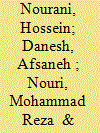

|
|
|
|
|
| Summary/Abstract |
On May 8, 2018, President Trump withdrew the US from the Joint Comprehensive Plan of Action (JCPOA). Since the JCPOA is endorsed by a United Nations Security Council Resolution and supported by the international community, Trump has had to justify this controversial decision. Based on data extracted from Trump’s Twitter account and taking advantage of Theo van Leeuwen’s (2008) discursive construction of the legitimation model, this article addresses the following question: How has Donald Trump attempted to delegitimize the JCPOA? Findings in this article show that Trump used the strategies of moral evaluation and rationalization in an attempt to delegitimize the JCPOA.
|
|
|
|
|
|
|
|
|
|
|
|
|
|
|
|
| 6 |
ID:
155573
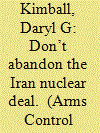

|
|
|
|
|
| Summary/Abstract |
Although his administration is already struggling with one major nonproliferation challenge—North Korea’s advancing nuclear and missile capabilities—President Donald Trump soon may initiate steps that could unravel the highly successful 2015 Iran nuclear deal, thereby creating a second major nonproliferation crisis.
|
|
|
|
|
|
|
|
|
|
|
|
|
|
|
|
| 7 |
ID:
134081
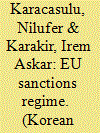

|
|
|
|
|
| Publication |
2014.
|
| Summary/Abstract |
Although there is enormous discussion on normative power Europe, there is relatively less focus on the EU sanctions regime, though sanctions have become a useful foreign policy tool as the EU has applied sanctions within the framework of the Common Foreign and Security Policy. Looking at the literature, Kreutz focused on the EU sanctions regime in the time period of 1981-2004, during which sanctions
were used to accomplish normative goals. Yet, later on Brummer argued that although norms and values still play a role in the EU's sanctions regime, more often they were surpassed by security and economic interests. This article examines the previous work on the EU sanctions regime and tries to comprehend why the use of sanctions has increased over time as well as whether they have been "selectively" used. In addition, the article analyzes whether the normative commitment is crucial in the construction of the EU sanctions regime. The EU sanctions regime toward Iran is analyzed in particular, because as indicated by Santini and Tabrizi, Iran is the first country against which the EU has developed a new strategy out of weapons of mass destruction concerns, starting in 2006. Since 2010, EU foreign ministers have adopted tougher sanctions in an effort to block its controversial nuclear program. Recently, the Iran nuclear deal of November 2013 was interpreted as attributable to sanctions against Iran, in which EU sanctions have constituted a remarkable role, have proven effective.
|
|
|
|
|
|
|
|
|
|
|
|
|
|
|
|
| 8 |
ID:
155578
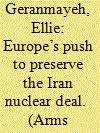

|
|
|
|
|
| Summary/Abstract |
Over the summer, there has been a re-energized push from the EU high representative for foreign affairs, Federica Mogherini, and the E3, that is, France, Germany, and the United Kingdom, urging the Trump administration to stay on board with the Iran nuclear deal, known as the Joint Comprehensive Plan of Action (JCPOA). This is a clear, immediate priority.
|
|
|
|
|
|
|
|
|
|
|
|
|
|
|
|
| 9 |
ID:
157753
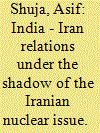

|
|
|
|
|
| Publication |
New Delhi, KW Publishers Pvt Ltd, 2018.
|
| Description |
xi, 234p.hbk
|
| Standard Number |
9789387324152
|
|
|
|
|
|
|
|
|
|
|
|
Copies: C:1/I:0,R:0,Q:0
Circulation
| Accession# | Call# | Current Location | Status | Policy | Location |
| 059326 | 327.54055/SHU 059326 | Main | On Shelf | General | |
|
|
|
|
| 10 |
ID:
182274
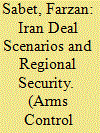

|
|
|
|
|
| Summary/Abstract |
The Iran nuclear deal is on life support. A major blow came in May 2018 when U.S. President Donald Trump withdrew from the agreement, formally known as the Joint Comprehensive Plan of Action (JCPOA), and launched a diplomatic, economic, and military “maximum pressure” campaign against Tehran. Despite expressing support for the agreement, President Joe Biden has delayed reentering it since taking office in January and instead retained the sanctions on Iran in a somewhat diminished form, thereby sustaining the deal’s precarious status.
|
|
|
|
|
|
|
|
|
|
|
|
|
|
|
|
| 11 |
ID:
139363
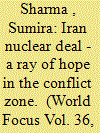

|
|
|
|
|
| Summary/Abstract |
Iran nuclear deal agreed in first week of April this year is a major breakthrough. After the long wait for almost 12 years, finally Iran agreed for accepting severely extensive inspection regime. No doubt, in bargain it got the promise from P5+1 i. e. U.S.A., U.K., Russia, France, China and Germany to lift all the sanctions imposed on it. On one hand deal is an initiative to end Iran’s isolation in world polity. On other, it marks an important step that world community has taken towards arms control in recent time. Of course all the details are yet to be finalized by the end of June. Nevertheless, it calls for an urgent need to enquire into the various aspects of this deal from the perspective of contemporary geo-politics.
|
|
|
|
|
|
|
|
|
|
|
|
|
|
|
|
| 12 |
ID:
179831
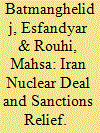

|
|
|
|
|
| Summary/Abstract |
To maximise the effectiveness of sanctions relief, the US must better ensure that lifting sanctions leads to substantial economic improvement.
|
|
|
|
|
|
|
|
|
|
|
|
|
|
|
|
| 13 |
ID:
144503


|
|
|
| 14 |
ID:
152977
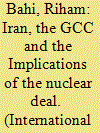

|
|
|
|
|
| Summary/Abstract |
The Joint Comprehensive Plan of Action, also known as the Iran nuclear deal, is consequential for Middle East regional security. It has raised a number of concerns for Arab Gulf states in relation to an emboldened Iran after sanction relief and the perceived shift of the US away from supporting its traditional allies in the Gulf. The international recognition and incorporation of Iran into regional power constellations resulting from the deal will intensify Saudi-Iranian rivalry to assert dominance. This rivalry and competition will increase in the short run, however, regional crises are expected to highlight the need for dialogue and engagement on regional affairs.
|
|
|
|
|
|
|
|
|
|
|
|
|
|
|
|
| 15 |
ID:
184989
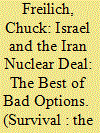

|
|
|
|
|
| Summary/Abstract |
Israel’s national security strategy in many ways has been a historic success. Once a weak, embattled state whose survival was at stake, Israel has become an essentially secure state whose existence is probably no longer in doubt. A nuclear Iran remains the only potentially existential threat, and Hizbullah a severe proximate threat. A simple process of elimination among the options available to Israel shows that a revived nuclear deal is the best of a bad lot. Sanctions, covert sabotage and a military attack are unlikely to yield long-term gains. No one knows if, when or how regime change will occur. A revived deal buys Israel the greatest amount of time and may produce new opportunities if extended. But Israel may eventually have no choice but to launch a military attack, possibly designed to force the international community to take decisive action.
|
|
|
|
|
|
|
|
|
|
|
|
|
|
|
|
| 16 |
ID:
134083
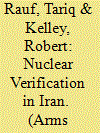

|
|
|
|
|
| Publication |
2014.
|
| Summary/Abstract |
For nearly a year, negotiations on Iran's nuclear program have been underway between Iran and the EU3+3 (China, France, Germany, Russia, the United Kingdom, and the United States).[1] The two sides in the negotiations, which the European Union has facilitated, are seeking a "mutually-agreed long-term comprehensive solution that would ensure Iran's nuclear programme will be exclusively peaceful."[2]
In November 2013, the sides agreed to an arrangement known as the Joint Plan of Action, under which Iran has taken substantial steps to address proliferation concerns about its nuclear activities. In particular, under International Atomic Energy Agency (IAEA) safeguards supplemented by additional IAEA monitoring and verification pursuant to the Joint Plan of Action, Iran has halted the production of uranium enriched to 20 percent uranium-235 and down-blended half its entire stock of that material to below 5 percent U-235 while converting the rest to uranium oxide, which cannot be immediately used for enrichment. In addition, Iran has capped the production of 5 percent-enriched uranium and accepted daily IAEA inspector access at its uranium-enrichment facilities at Natanz and Fordow and monthly access at the under-construction Arak heavy-water reactor, among other measures.[3]
|
|
|
|
|
|
|
|
|
|
|
|
|
|
|
|
| 17 |
ID:
148605
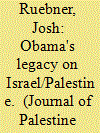

|
|
|
|
|
| Summary/Abstract |
This retrospective assessment argues that despite the arrival in office in 2009 of a president who articulated the case for Palestinian rights more strongly and eloquently than any of his predecessors, U.S. official policy in the Obama years skewed heavily in favor of Israel. While a negotiated two-state resolution of the conflict between Israel and the Palestinians continued to be the formal goal of the United States, Israel's defiant refusal to stop settlement expansion, the administration's determined actions to perpetuate Israeli impunity in international fora, as well as the U.S. taxpayer's hefty subsidy of the Israeli military machine all ensured that no progress could be made on that score. The author predicts that with all hopes of a negotiated two-state solution now shattered, Obama's successor will have to contend with an entirely new paradigm, thanks in no small part to the gathering momentum of the Boycott, Divestment and Sanctions (BDS) movement.
|
|
|
|
|
|
|
|
|
|
|
|
|
|
|
|
| 18 |
ID:
149849
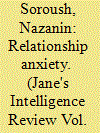

|
|
|
|
|
| Summary/Abstract |
The election of Donald Trump as US president has increased risks for the future of the JCPOA nuclear agreement with Iran, In the wake of the election, Nazanin Soroush examines the likely outlook for the agreement in the context of Iranian domestic politics.
|
|
|
|
|
|
|
|
|
|
|
|
|
|
|
|
| 19 |
ID:
158522
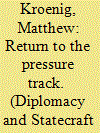

|
|
|
|
|
| Summary/Abstract |
During the 2016 United States presidential election campaign, Donald Trump promised to “renegotiate” the July 2015 Joint Comprehensive Plan of Action, better known as the Iran nuclear deal. The deal does not prevent Iran from building nuclear weapons and in some ways actually makes it easier for Iran to go nuclear in the future. The mere continuation of the current deal could undermine America’s interests in the Middle East and its global non-proliferation policy. How then can the Donald Trump Administration work to renegotiate the deal? This analysis provides a strategy that the Trump Administration can follow to improve American policy toward Iran, namely do what Iran is doing to the United States: abide by the strict terms of the agreement, whilst competing in all of the ways not covered in the deal. From an American perspective, increasing pressure on Tehran will constrain Iran’s destabilising influence in the region. Over time, Washington can leverage the pressure to force Iran back to the table to strike a renegotiated agreement that eliminates, not just delays, the Iranian nuclear and missile threat.
|
|
|
|
|
|
|
|
|
|
|
|
|
|
|
|
| 20 |
ID:
160079
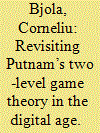

|
|
|
|
|
| Summary/Abstract |
Few studies to date have investigated the impact of digitalization on Putnam’s two-level game theory. Such an investigation is warranted given that state and non-state actors can employ digital tools to influence decision-making processes at both national and international levels. This study advances a new theoretical concept, Domestic Digital Diplomacy, which refers to the use of social media by a government to build domestic support for its foreign policy. This model is introduced through the case study of the @TheIranDeal twitter channel, a social media account launched by the Obama White House to rally domestic support for the ratification of the Iran Nuclear Agreement. The study demonstrates that digitalization has complicated the two-level game by democratizing access to foreign policy decisions and increasing interactions between the national and international levels of diplomacy.
|
|
|
|
|
|
|
|
|
|
|
|
|
|
|
|
|
|
|
|
|